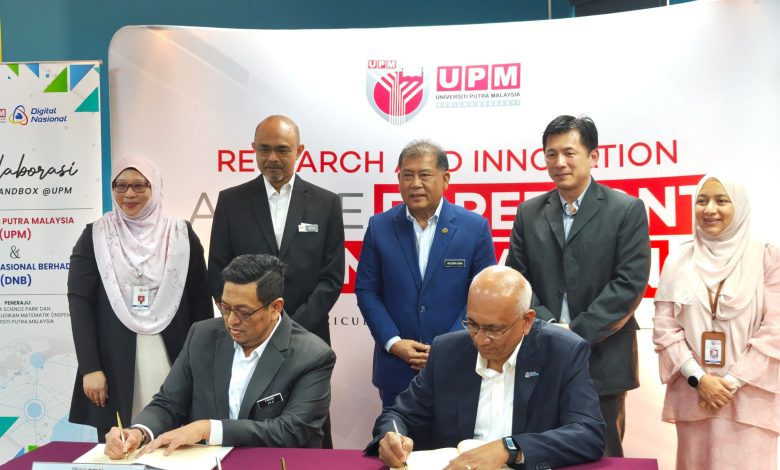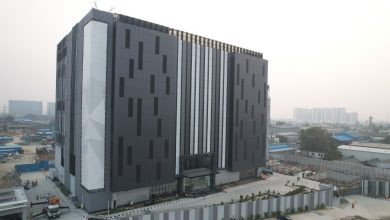UPM, DNB Partner to Launch Malaysia’s First 5G-Enabled AI Sandbox Campus
Enabling Real-Time, Unmanned Aerial Systems and Accelerating Innovation Across Key National Sectors

Universiti Putra Malaysia (UPM) and Digital Nasional Berhad (DNB) recently signed a Memorandum of Understanding (MoU) to establish Malaysia’s first 5G-powered unmanned aerial system sandbox for Beyond Visual Line of Sight (BVLOS) operations. This strategic collaboration marks a major step forward in integrating 5G and Artificial Intelligence (AI) technologies to enable real-time, unmanned aerial systems and accelerate innovation across key national sectors.
The signing ceremony was witnessed by Yang Berhormat Datuk Wilson Ugak Kumbong, Deputy Minister of Digital, who reaffirmed the Ministry’s commitment to fostering whole-of-society innovation and creating practical platforms for students, researchers, startups, and regulators to test and scale emerging technologies.
“What once sounded like science fiction is now within reach. With the right ecosystem in place—one that is safe, structured, and well-regulated, we can transform unmanned aerial systems and vehicles from experimental tools into practical solutions for public benefit,” said YB Datuk Wilson.
Supporting Unmanned Aerial Systems with Innovation
Under the MoU, UPM will develop a real-world unmanned aerial systems sandbox, supported by 5G connectivity and AI capabilities. The initiative includes four dedicated zones for urban air mobility, agriculture, autonomous robotics, and healthcar—each designed to support research, testing, and eventual commercial deployment of AI and blockchain systems.
“This partnership reflects our shared vision to build a resilient digital ecosystem that empowers local talent and drives inclusive innovation,” said Datuk Azman Ismail, CEO of DNB. “By combining the national 5G network with UPM’s academic strengths, we are laying the foundation for scalable unmanned aerial systems operations that can transform multiple industries.”
UPM Vice-Chancellor, Dato’ Professor Ir. Dr. Ahmad Farhan Mohd Sadullah, stated that this collaboration marks UPM as the first university to be equipped with 5G network infrastructure directly from DNB, the 5G network provider in Malaysia.
“This facility is expected to accelerate research implementation, commercialisation of innovation outcomes, and the development of new technologies in areas such as AI, the Internet of Things (IoT), and automation systems—particularly within the agriculture and biotechnology industries. Ultimately, this will contribute to the adoption of efficient technologies and sustainable innovations derived from research that can support national food security, which is UPM’s primary mandate,” Dr. Sadullah noted.
The collaboration also supports the Ministry’s broader ambition to position Malaysia as a regional leader in future technologies, in line with its preparations to host the ASEAN AI Malaysia Summit 2025. UPM’s AI Sandbox is expected to serve as a case study in responsible, real-world AI deployment during the summit.
Ericsson to Power Mission-Critical Systems
As part of the DNB-UPM collaboration, Ericsson is powering the mission-critical unmanned aerial system vehicle (UAV) using advanced 5G technology. The drone gets its own secure and dedicated connection, ensuring uninterrupted real-time telemetry back to the command centre. This is made possible by smart allocation of network resources.
David Hägerbro, Head of Ericsson Malaysia, Sri Lanka and Bangladesh, said: “The DNB network, combined with Ericsson’s leading technology, creates a powerful foundation for this collaboration with UPM. It helps drive digitalisation and supports the growth of a future-ready ecosystem for Malaysia’s youth, universities, and innovation.”
The initiative includes close engagement with the Civil Aviation Authority of Malaysia (CAAM) to ensure all BVLOS operations comply with national airspace regulations. It is part of a wider effort to develop enabling frameworks, from safety protocols and insurance models to local authority coordination that support responsible drone deployment.
Future collaborations are expected in areas such as logistics, precision agriculture, public safety, and digital healthcare, all contributing to Malaysia’s vision of becoming a digitally sovereign, future-ready nation.




